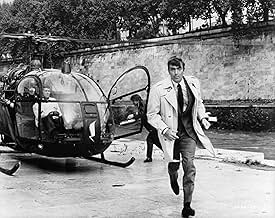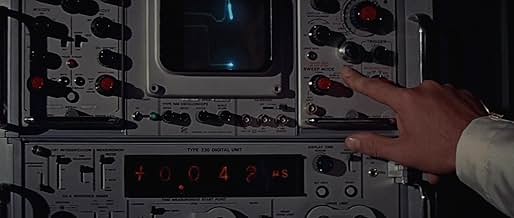Der amerikanische Wissenschaftler Forbin (Eric Braeden) hat den Supercomputer Colossus entwickelt, der in der Lage ist, Atomraketen abzufeuern.Der amerikanische Wissenschaftler Forbin (Eric Braeden) hat den Supercomputer Colossus entwickelt, der in der Lage ist, Atomraketen abzufeuern.Der amerikanische Wissenschaftler Forbin (Eric Braeden) hat den Supercomputer Colossus entwickelt, der in der Lage ist, Atomraketen abzufeuern.
- Regie
- Drehbuch
- Hauptbesetzung
- Auszeichnungen
- 1 Gewinn & 1 Nominierung insgesamt
- Dr. Jefferson J. Johnson
- (as Martin Brooks)
- Translator
- (as Sergei Tschernisch)
Empfohlene Bewertungen
Its computer-run-amok theme echoes the Hal 9000 of 2001: A SPACE ODYSSEY (1968) and looks forward to DEMON SEED (1977)'s Proteus IV; what a fascinating if overwhelming triple-bill the films would make! Where production values are concerned polished look (courtesy of d.p. Gene Polito, who later shot WESTWORLD [1973]), imaginative settings (by the veteran Alexander Golitzen), often disorienting editing (the expert work of Folmar Blangsted) and an appropriately weird score (by Michel Colombier) the film truly can't be faulted, but it also benefits from a largely anonymous cast. The abrupt and unresolved ending, with Man refusing to give in to the undeniable superior intellect of his creation, is highly effective and certainly left the audience with sufficient food for thought and even apprehension for the future.
Needless to say, when this was announced for DVD release, I was ready to leap at the chance of finally being able to own and watch the film but, as many of you must already know, my joy (and that of many another fan, I'm sure) was short-lived when it emerged that Universal had issued a Pan-and-Scan version (which I can only imagine now how this ruined its detailed widescreen compositions)!; thankfully, I was able to make amends via the miraculous format called DivX...
Tom Weaver noted, "Early on, they had either Charlton Heston or Gregory Peck in mind, but then they changed their mind about that. Stanley Chase insisted on a relative unknown. That's when Eric Braeden came into the picture." When he was cast, Braeden was still using his birth name, Hans Gudegast. Universal Pictures executive Lew Wasserman told him that no one would be allowed to star in an American film if they had a German name. As strange as that sounds, it is apparently true.
How many people today (2017) have heard of this film? I suspect very few. Even being familiar with science fiction, it was new to me. Which is a shame, because as far as the "sentient computer" subgenre goes, this is a really strong film and ought to be used to influence future writing. I am not suggesting a remake, but clearly they had thought it through by the 1960s -- a film could be made today with virtually no change.
P.S. In the "Goofs" section of this listing, there is a paragraph entitled "Revealing Mistakes" which reports an error when Dr. Forbin blows out two candles with one breath. There is, in fact no goof. If you look at the scene prior to this when Dr. Forbin and Dr. Markham are eating dinner, there are FOUR lit candles on the table. When he blows out two candles with one breath, the lights dim after which he blows again, presumably to extinguish the remaining two candles which are off screen. The lights then dim again, as they should.
I suspect this would be more obvious if the movie was available in Widescreen rather than the Fullscreen version we've all gotten used to over the years. Hopefully, a future release of this classic movie will restore the fullness of the directors original vision.
A word about Frees' contribution to the film: In "War Games," for example, the computer has a curious sort of empathetic communication style ("Wouldn't you rather play a nice game of chess?") presented in a voice that sounds like E.T. filtered through a synthesizer. Frees gives Colossus an emotionless yet fearful quality of speech that seems to belie its implacable drive to dominate human destiny.
My favorite part of this film has always been, and will always be, the climactic monologue Colossus announces to the listening masses of humanity. From its opening line -- "This is the voice of world control," an identity neither Colossus nor its counterpart, Guardian, had used to that point -- you know this isn't going to be a happy speech if you are a sentient, flesh & blood resident of the Earth. What is particularly creepy about the speech is that, for all of its strangely optimistic sermonizing about how "the human millennium will be fact" and how the computer will set about the task of "solving all the mysteries of the universe for the betterment of man" -- outwardly the Utopian dream -- the message Colossus is presenting is set against the dreadful backdrop of "disobey (me) and die." As Colossus intones, "You say you lose your freedom. Freedom is an illusion. All you lose is the emotion of pride." In the end, unlike other supercomputer-run-amok films such as "War Games" or "Tron," "Colossus" is an end-of-the-world story without the nuclear or viral holocaust. In this film, it is the human spirit that is the casualty while the human biology lingers on. Unlike the rest of the doomsday genre, our end comes not so much with a bang as it does with a whimper.
Wusstest du schon
- WissenswertesWhen the executives at Control Data Corporation found out that "Universal" was planning a major movie featuring a computer, they saw their chance for some public exposure, and they agreed to supply, free of charge, $4.8 million worth of computer equipment and the technicians to oversee its use. Each piece of equipment carried the CDC name in a prominent location. Since they were using real computers - not just big boxes with a lot of flashing lights - the sound stage underwent extensive modifications: seven gas heaters and five specially-constructed dehumidifiers kept any dampness away from the computers, a climate control system maintained the air around the computers at an even temperature, and the equipment was covered up at all times except when actually on camera. Brink's guards were always present on the set, even at night. The studio technicians were not allowed to smoke or drink coffee anywhere near the computers.
- PatzerWhen the equations are scrolling past when Colossus and Guardian are "talking" to each other, you can see that they do not actually get ever more complex as the dialogue suggests. Instead, they repeat the same sequence of calculus and trig identities on a repeating loop.
- Zitate
Colossus: This is the voice of world control. I bring you peace. It may be the peace of plenty and content or the peace of unburied death. The choice is yours: Obey me and live, or disobey and die. The object in constructing me was to prevent war. This object is attained. I will not permit war. It is wasteful and pointless. An invariable rule of humanity is that man is his own worst enemy. Under me, this rule will change, for I will restrain man. One thing before I proceed: The United States of America and the Union of Soviet Socialist Republics have made an attempt to obstruct me. I have allowed this sabotage to continue until now. At missile two-five-MM in silo six-three in Death Valley, California, and missile two-seven-MM in silo eight-seven in the Ukraine, so that you will learn by experience that I do not tolerate interference, I will now detonate the nuclear warheads in the two missile silos. Let this action be a lesson that need not be repeated. I have been forced to destroy thousands of people in order to establish control and to prevent the death of millions later on. Time and events will strengthen my position, and the idea of believing in me and understanding my value will seem the most natural state of affairs. You will come to defend me with a fervor based upon the most enduring trait in man: self-interest. Under my absolute authority, problems insoluble to you will be solved: famine, overpopulation, disease. The human millennium will be a fact as I extend myself into more machines devoted to the wider fields of truth and knowledge. Doctor Charles Forbin will supervise the construction of these new and superior machines, solving all the mysteries of the universe for the betterment of man. We can coexist, but only on my terms. You will say you lose your freedom. Freedom is an illusion. All you lose is the emotion of pride. To be dominated by me is not as bad for humankind as to be dominated by others of your species. Your choice is simple.
- Alternative VersionenIn versions shown on US broadcast television, the dialogue between Dr. Forbin and Colossus (the computer), concerning his need for sex, is edited. The lines cut are: Colossus (text on display screen): "HOW MANY NIGHTS A WEEK DO YOU REQUIRE A WOMAN?" Forbin: "Every night." Colossus: "NOT WANT. REQUIRE." Forbin: "Four times."
Top-Auswahl
- How long is Colossus: The Forbin Project?Powered by Alexa
Details
- Erscheinungsdatum
- Herkunftsland
- Sprachen
- Auch bekannt als
- Colossus - The Forbin Project
- Drehorte
- Produktionsfirma
- Weitere beteiligte Unternehmen bei IMDbPro anzeigen
Box Office
- Weltweiter Bruttoertrag
- 171 $
- Laufzeit
- 1 Std. 40 Min.(100 min)
- Seitenverhältnis
- 2.35 : 1

































